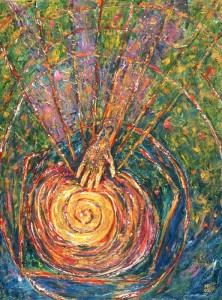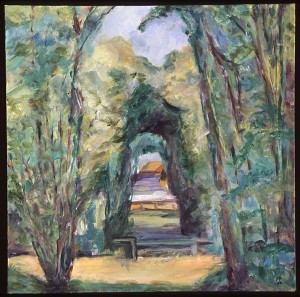 The locked box of transcendence, for which all of us hold the key (something which a lot of people have forgotten or never learned) can open the universe to us and help us discover our unique place in it. I had thought that organized religion might play a vital role in helping me in my voyage of discovery. Instead it became increasingly an obstacle, even irrelevant…or perhaps I was expecting too much from it.
The locked box of transcendence, for which all of us hold the key (something which a lot of people have forgotten or never learned) can open the universe to us and help us discover our unique place in it. I had thought that organized religion might play a vital role in helping me in my voyage of discovery. Instead it became increasingly an obstacle, even irrelevant…or perhaps I was expecting too much from it.
My hunger for transcendence has always led me toward wholeness, integration, and connection. I remember as a child soaking in the wonder of mosses, ferns and mushrooms in the forest near my home. I spent hours there sensing my connection to God and the universe. These times in the woods helped me move beyond my limitations of time and space, beyond the confines of my body and mind, and soothed my sensitive spirit as I dove into new dimensions. I sought to liberate myself and find radical freedom. This has been and continues to be my spiritual quest, defying logic and rationality, ignoring empirical evidence to the contrary.
I will not try to define “spiritual” or “soul”. This is something very person for each of us, and so I ask you, kind reader, to do that for yourself. That is your first and most radical step toward true transcendence.
In my post-graduate studies in historical theology and spirituality I came to realize that nearly all of religions start out as radical movements meant to address political, social, and economic as well as spiritual issues. Most of them relied on a seminal founder whose message inspired teachings and eventually texts as those teachings were recorded for posterity. The historic events surrounding the founder shaped the mindset of the community of followers.
Very soon the central ideas on which the community relied became ritualized in sacred actions celebrated on holy days in order not to be forgotten. The codifying of these rituals and the stories surrounding them came to be written down and set apart as “inspired.” And so were the seeds of an organized religion planted.
The intention to provide sign posts for future believers required leaders who were educated in the “system” and could represent the seminal founder. The community often asked them to interpret the words and events most important to them. The greater responsibility they were given, the more they became separated as a distinct class among “ordinary” believers; thus the rise of the clergy.
Once believers sought leaders to carry on their traditions, they also seemed to need an organization that would keep order in the growing community. This structure ensured that the spiritual leaders would be held accountable, that the purity of the message would be maintained, and that potential new members would meet the requirements for reception into the mysteries of the community. Eventually organization devolved into government and bureaucracy, even stooping so low as to shed blood through conflicts and wars in defense of the “true” faith.
 All of this developed ostensibly to offer the ordinary person the opportunity to unlock the box of transcendence to find a deeper meaning for their lives! Perhaps the most well known example of this kind of religion is the Roman Catholic Church. But it is by no means unique among organized religions, great and small.
All of this developed ostensibly to offer the ordinary person the opportunity to unlock the box of transcendence to find a deeper meaning for their lives! Perhaps the most well known example of this kind of religion is the Roman Catholic Church. But it is by no means unique among organized religions, great and small.
In time what the Catholic Church and most religions feared was that the ordinary believer might go beyond the defined parameters of official teachings to find transcendence. What if they were to discover that they didn’t really need the religious structures to unlock the deepest and most profound transcendence? Is religion really relevant? And how must it change in order to keep up with its followers? More about that next time!
Contact me at michael@parisecoaching.com
Original art copyrighted by Michael Parise
